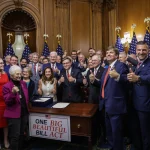A long-running effort to shift Kentucky’s elections for governor and other statewide offices to coincide with presidential elections won approval in the state Senate on Wednesday. Now comes a much bigger test for supporters: whether they can muster enough votes to win House passage.
The measure is aimed at amending Kentucky’s constitution to end the long Bluegrass State tradition of holding elections for governor and other state constitutional offices in odd-numbered years. The proposal would switch those contests to presidential election years, starting in 2032.
The proposal won Senate approval on a 26-9 vote after a long debate, sending it to the House. Similar proposals in previous years died in the House.
KENTUCKY DEMOCRATIC GOVERNOR AND HOUSE REPUBLICANS CLASH ON TEACHER RAISES
If this year’s measure ultimately passes both chambers, it would be placed on the November ballot for Kentucky voters to decide whether to end the odd-year elections for governor, attorney general, secretary of state, auditor, treasurer and agriculture commissioner.
Republican Sen. Chris McDaniel has pushed for the constitutional change for a decade. His proposals made it through the Senate in the past but always died in the House.
After the Senate vote Wednesday, McDaniel urged House leaders to give Kentucky voters the chance to weigh in on the matter. Both chambers have Republican supermajorities.
House Speaker David Osborne stopped short of commenting on its prospects Wednesday, noting there were “pretty strong opinions on it on both sides” among House members in previous years.
“We will start having those conversations with the caucus and try to get the pulse of it,” the speaker told reporters. “I wouldn’t predict at this point.”
Under Kentucky’s current system, there are elections three out of every four years. The bill’s supporters said that’s a reason to make the change.
“There’s voter fatigue having elections three out of every four years,” Republican Senate Majority Floor Leader Damon Thayer said in supporting the measure.
McDaniel said if his proposal had won legislative approval a decade ago and been ratified by voters, Kentucky’s counties would have collectively saved more than $30 million by now from a reduction in elections, while the state would have saved nearly $4 million.
“And Kentuckians would have been spared countless hours of political ads interrupting their lives in odd-numbered years,” McDaniel said.
Supporters also said voter turnout for the statewide offices would be much higher if those elections coincided with presidential elections.
Speaking against the bill, Democratic Sen. Reginald Thomas said Kentucky should continue its tradition of keeping statewide issues at the forefront by holding the odd-year elections. Overlapping statewide contests with presidential elections would overwhelm state issues, he said.
“This is purely a political measure designed to really be influenced by the presidential elections,” Thomas said. “And that is a bad way for Kentucky to go.”
If voters approve the change, the state would still have one more round of statewide elections in 2027. Gov. Andy Beshear and Lt. Gov. Jacqueline Coleman, both Democrats, won re-election last year while Republicans won the other constitutional offices.
Terms for governor and the other statewide offices would still last four years. But if the proposal wins ratification, candidates elected to those offices in 2027 would get an extra year added to their terms in order to bring those elections in line with the presidential election in 2032.
























